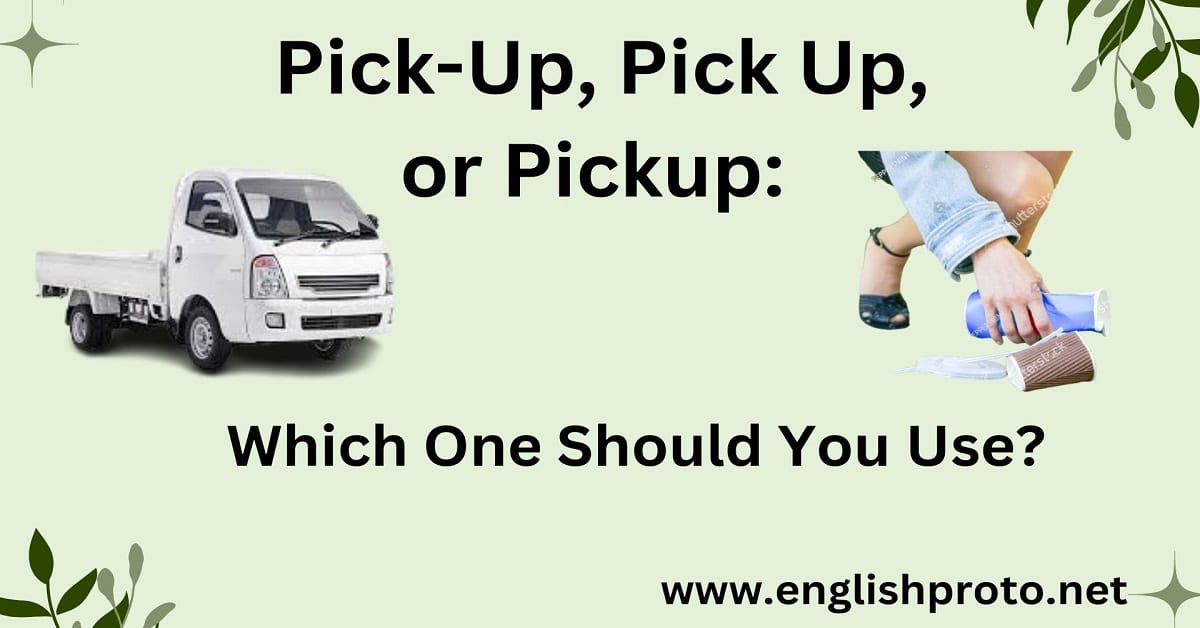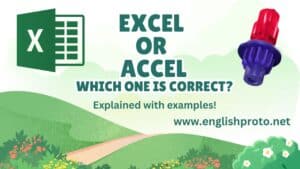Pick-Up, Pick Up, or Pickup: What’s the Correct Usage? If you’ve ever paused mid-sentence, wondering which version to use, you’re not alone. These three terms may look similar, but their meanings and uses are worlds apart.
Whether you’re texting a friend, writing an email, or crafting a professional report, knowing the difference can save you from awkward misunderstandings, and boost your confidence in writing.
But here’s the kicker: mastering these tiny distinctions is easier than you think! This article breaks it all down for you with simple examples, real-world applications, and tips that stick. Ready to level up your grammar game? Let’s dive in!
Why Does It Matter?
Whether you’re writing a professional email, creating a blog post, or just texting a friend, using the wrong term can send the wrong message. Clarity is key in communication, and understanding the differences between pick-up, pick up, and pickup can elevate your language skills, improve your writing, and avoid embarrassing misunderstandings.
Quick Summary
Here’s a snapshot of how these terms differ:
- Pick-up: A compound noun or adjective. It describes something related to collecting or retrieving. Example: “The team had a pick-up game after practice.”
- Pick up: A phrasal verb. It refers to the act of lifting, collecting, or acquiring something. Example: “I need to pick up groceries after work.”
- Pickup: A single noun, often used to refer to vehicles, scheduled collections, or informal sports activities. Example: “He drives a shiny new pickup truck.”
Key Takeaways
- Use pick-up when describing an event or object involving retrieval.
- Use pick up for actions requiring lifting, gathering, or acquiring.
- Use pickup for vehicles, sports, or pre-scheduled collections.
Reasons for Confusion
Why do these terms trip people up? The confusion stems from a mix of factors:
- Similar Sound: All three are pronounced the same way, making it tricky to distinguish them in conversation.
- Overlapping Contexts: The meanings often overlap, especially when discussing events or actions involving collecting or retrieving something.
- Regional Usage: Variations in British and American English contribute to inconsistent hyphenation rules.
- Hyphenation Trends: Modern English has seen a shift toward eliminating hyphens, causing uncertainty about when to use them.
- Evolving Language: As language evolves, some compound words lose their hyphen (e.g., “email” from “e-mail”), adding to the confusion.
Detailed Explanation of Each Term
Pick-Up: The Hyphenated Form
The hyphenated form pick-up is primarily used as a noun or adjective to describe actions, events, or things related to the act of collecting or retrieving.
When to Use “Pick-Up”:
- As a Noun:
- Refers to the act of collecting or retrieving something.
- Example: “The courier arranged a pick-up for the package.”
- Here, “pick-up” means the scheduled event of retrieving the item.
- As an Adjective:
- Modifies a noun to describe its nature or purpose.
- Example: “They played a pick-up basketball game.”
- In this case, “pick-up” describes the type of game—informal and impromptu.
- In Sports:
- Frequently used to describe informal, unorganized games.
- Example: “The park is always full of pick-up soccer games.”
⚡ Quick Tip: If you can replace “pick-up” with “collection” or “impromptu” without changing the sentence’s meaning, the hyphenated form is likely correct.
Pick Up: The Phrasal Verb
The two-word form pick up is a phrasal verb. It describes an action and is always used in a sentence where something or someone is being lifted, collected, or improved.
When to Use “Pick Up”:
- Physical Action:
- Refers to lifting or raising something.
- Example: “Could you pick up that book from the floor?”
- Here, the action involves physically lifting the book.
- Collecting Someone or Something:
- Involves retrieving or gathering a person or item.
- Example: “I’ll pick up Sarah from the airport.”
- This indicates the action of collecting someone.
- Acquiring Knowledge or Skills:
- Describes learning or gaining something.
- Example: “She picked up some Spanish while traveling in Mexico.”
- The phrase here refers to acquiring knowledge informally.
- Improvement or Increase:
- Indicates recovery or enhancement.
- Example: “Business picked up after the holiday season.”
- This usage conveys growth or improvement.
⚡ Quick Tip: If the sentence focuses on an action, use the two-word form pick up.
Pickup: The Single Word
The single word pickup is a noun. It refers to objects, vehicles, or prearranged events. This form is more specific and commonly used in certain industries, such as automotive or logistics.
When to Use “Pickup”:
- Vehicles:
- Refers to a light truck designed for carrying cargo.
- Example: “He bought a brand-new pickup last weekend.”
- Scheduled Collections:
- Describes an event where something is collected.
- Example: “The store offers curbside pickup services.”
- Sports or Activities:
- Refers to informal or impromptu sports games.
- Example: “We played a fun pickup basketball game at the gym.”
⚡ Quick Tip: If you’re referring to something tangible, like a truck or a prearranged event, the single-word pickup is the best choice.
Common Errors and How to Avoid Them
Here’s a table highlighting frequent mistakes and the correct usage:
| Incorrect Usage | Correct Usage | Why? |
|---|---|---|
| “Can you pickup the groceries?” | “Can you pick up the groceries?” | “Pickup” is a noun, but the action requires the verb “pick up.” |
| “They scheduled a pick up.” | “They scheduled a pick-up.” | “Pick-up” is a noun here, describing the scheduled event. |
| “We joined a pick up game.” | “We joined a pick-up game.” | The adjective “pick-up” describes the informal nature of the game. |
Synonyms and Alternatives
If you’re unsure which form to use, consider these synonyms:
- For “pick up” (verb): “Lift,” “collect,” “retrieve,” “gather.”
- For “pick-up” (noun/adjective): “Collection,” “impromptu,” “unscheduled.”
- For “pickup” (noun): “Truck,” “delivery,” “retrieval.”
Using synonyms can sometimes simplify your writing and avoid ambiguity.
Examples in Sentences
Let’s explore some practical examples to reinforce proper usage:
- Pick-Up:
- “The team organized a pick-up volleyball game.”
- “The courier scheduled a pick-up for the documents.”
- Pick Up:
- “I need to pick up my laundry before 6 PM.”
- “He picked up the baby and rocked her to sleep.”
- Pickup:
- “We drove to the store in a pickup truck.”
- “The package was ready for pickup at the front desk.”
Origins and History
The terms pick up, pick-up, and pickup all trace their origins to the Old English word piccian, meaning “to pick or peck.” Over centuries, the word evolved, incorporating nuances of lifting, collecting, and gathering.
The compound forms emerged in modern English, reflecting practical and industrial needs, such as describing vehicles (pickup trucks) or sports (pick-up games).
The hyphenated form pick-up became common in the 20th century but has seen less frequent use as language trends favor simpler, single-word forms like “pickup.”
Conclusion
Understanding the difference between pick-up, pick up, and pickup is essential for effective communication. Each form serves a unique purpose, whether it’s describing an action, event, or object. By mastering these distinctions, you can avoid common mistakes and ensure your writing is polished and professional.
Recap:
- Use pick-up for nouns or adjectives tied to collection or retrieval events.
- Use pick up when describing actions like lifting, gathering, or acquiring.
- Use pickup as a noun for vehicles, collections, or informal games.
Next time you’re writing about a pickup truck, scheduling a pick-up, or planning to pick up groceries, you’ll know exactly which form to use. Your readers, and your grammar, will thank you!



